STORY AND PHOTOS BY TAYLOR SHAPPERT
Service dogs aren’t just for the visually impaired. “Service dogs” and “guide dogs” can be synonymous sometimes, but service dogs can do so much more than lead the blind.
There are service dogs to help people with visual or hearing impairments, epilepsy, autism or diabetes.
Donna Woodstock of Sheridan’s Accessible Learning Office thinks students should know about the different talents service dogs have to offer. That’s why she invited Wade Beattie, founder of Autism Dog Services, to bring two autism service dogs to Sheridan last Tuesday.
“I wanted to bring attention to the autism-Asperger’s spectrum because students need to know about it whether they have autism or not,” Woodstock said at a booth set up with a donation box, and chocolates and water bottles for sale to raise funds.
Wade Beattie founded Autism Dog Services (ADS) in Lynden, Ont., in 2007.
“We provide service dogs for autistic children between the ages of 3 and 18. And our dogs mostly provide safety, companionship and an attendant for children,” he said.
About 20 of the children matched with service dogs take their canines to school.
“It can help them in the school environment to focus, to ground, for social communication,” Beattie said.
His organization has about 40 puppies in foster homes right now. “They stay with foster families for about 14 or 15 months. Then they go on to their advanced training and if everything goes well, we can look at placing a dog at about 18 months,” he said.
Fifteen to 20 dogs are placed in new homes every year, Beattie said.
When training dogs to be paired with an autistic child, “largely we focus on safety, companionship and independence,” he said when he brought Jade, a yellow lab, and Koda, a chocolate lab to Sheridan.
“The dogs can help with mood-stabilizing, behaviour, help with transitioning to difficult environments and help with greater social interaction.”
He said the dogs help with social interaction because the animals invite attention and interaction wherever they go.
The dogs did exactly that between the library and the Learning Commons when several students stopped to shower the canines with attention.
Greg Lowenthal checked out the dogs. “This is something I believe in. This is a good cause,” said the first-year journalism student, who has Asperger’s.
Some people who have autism are not vocal, “so if they have a guide dog with them they’re able to tell people, either through written language or the dogs themselves, exactly how they’re feeling,” said the 28-year-old.
Students who were not autistic also came to pet the pups, and learned a bit about autism and Asperger’s while they were there.

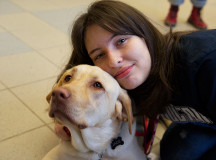
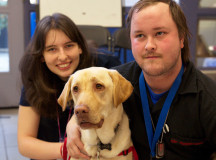
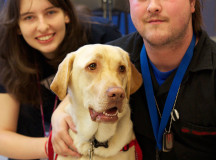
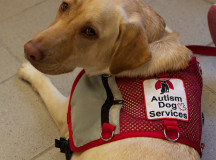
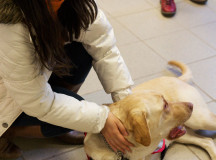
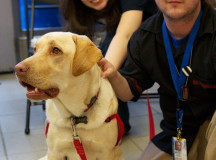
Comments
One response to “Autism service dogs visit Sheridan”
The Sheridan Sun did well with publishing this article. This article will hopefully make people more aware of what Autism is and how it impacts those who are affected by it.